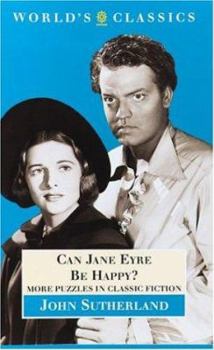Can Jane Eyre Be Happy?: More Puzzles in Classic Fiction
Select Format
Select Condition 
Book Overview
The exciting sequel to the enormously successful Is Heathcliff A Murderer?, John Sutherland's latest collection of literary puzzles, Can Jane Eyre Be Happy? turns up unexpected and brain-teasing aspects of the range of canonical British and American fiction represented in the World's Classics list. With bold imaginative speculation he investigates thirty-four literary conundrums, ranging from Daniel Defoe to Virginia Woolf.
Covering issues well...
Format:Paperback
Language:English
ISBN:019283309X
ISBN13:9780192833099
Release Date:August 1997
Publisher:Oxford University Press, USA
Length:256 Pages
Weight:0.34 lbs.
Dimensions:0.5" x 4.6" x 7.3"
Customer Reviews
5 ratings
Answers to questions you never thought to ask
Published by Thriftbooks.com User , 14 years ago
In this book, a follow-up to his Is Heathcliff a Murderer?: Great Puzzles in Nineteenth-Century Fiction (Oxford World's Classics)Sutherland seeks to answer questions that most of us have never asked. Some are unanswerable, except by reaching for that old chestnut,"even Homer nods"! But, for others, he actually comes up with reasonable (or not wildly unreasonable) explanations. And it's rather fun getting there. Have you ever wondered what is in Heathcliff's will? Or what the Prynnes were doing in Boston? Neither have I. Nevertheless, I enjoyed Sutherland's attempts to answer these and other literary conundrums. He has a fine sense of humor, taking none of this too seriously. His disquisition on the question, "What is Elfride's rope made of?" (Thomas Hardy's A Pair of Blue Eyes (Oxford World's Classics), had me in stitches. It's not even necessary to have read the books (does anyone, not a college English major, actually read Ford Maddox Ford's The Good Soldier (Barnes & Noble Classics Series) these days?), you'll find plenty of diversion, anyway.
Another excellent collection of literary brain-teasers
Published by Thriftbooks.com User , 22 years ago
Lovers of Mr. Rochester beware - in this, his second book of literary puzzles, John Sutherland turns his considerable powers of literary analysis towards, amongst other things, undoing the good reputation enjoyed by Jane Eyre?s brooding hero. Bronte fans, brace yourself for some idol-smashing. As in his first book of devoted to literary head-scratchers (the wonderful Is Heathcliff a Murderer?), Sutherland here sets himself out to answer some of Western literature?s most intriguing questions. Though you might not always agree with some of the conclusions Sutherland comes to (we have to have a talk, he and I, about Mr. Rochester?s moral integrity) as a writer he is always witty, as a thinker always innovative, and as a guide through literature?s most baffling conundrums, always genial. Buy this book and I promise not only will you learn something (and, if you?re anything like me, get into some very heated debates with fellow literature lovers about Jane Eyre?s prospects for bliss, etc.) - but you?ll also have a heck of a lot of fun.
Classics brought to life in a whole new light!
Published by Thriftbooks.com User , 22 years ago
"Can Jane Eyre Be Happy" is only one of the many questions about classical literature you will have answered by this book. Other novels explored include "Great Expectations", "Mansfield Park", "Hound of the Baskervilles," and other novels of that genre and category. Sutherland's insights are simple and straightforward and his questions are probing and answer those sometimes irrelevant things your curiosity won't let you sit on! However, this book loses one star because Sutherland often does try to contradict the author and occasionally discards the author's motive in writing the novel. Also a warning: Don't read through the table of contents before you have read all the books addressed therein. Some of the questions assigned to each book will give away or ruin in part the ending to the novel. Luckily this is not a major setback. I do heartily recommend this book, but the reader must be open to new ideas about some of his or her favorite novels and authors, and must also take Sutherland's ideas with a pinch of skepticism.
Why Angel couldn't marry Liza-Lu
Published by Thriftbooks.com User , 23 years ago
As Sutherland points out, the 1835 act prohibited marriage with a deceased wife's sister. However, aside from this, she was not "too young to marry for a month or so." A girl could be married at 12 in Britain until the Age of Marriage Act of 1929, although the age of consent for sexual intercourse was raised 1n 1881 from 13 to 16. Whatever Roger Prynne's reasons for staying away, Massachussetts was not a place "where they like to burn witches and wizards." (They hanged them). I enjoyed combing for nits to pick.
Well, can she?
Published by Thriftbooks.com User , 24 years ago
God, I wish I had the brains John Sutherland. Why the heck don't we think of these things when we read? These puzzles are fascinating. I am amazed at the information John Sutherland brings out in these puzzles. A must for everyone who loves Victorian fiction.





